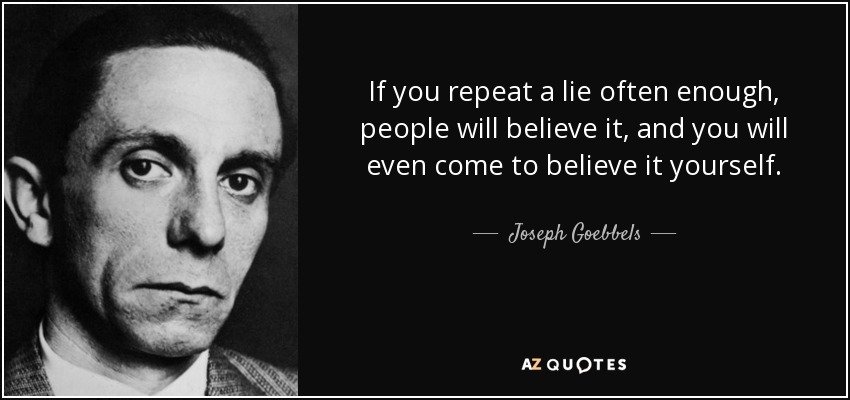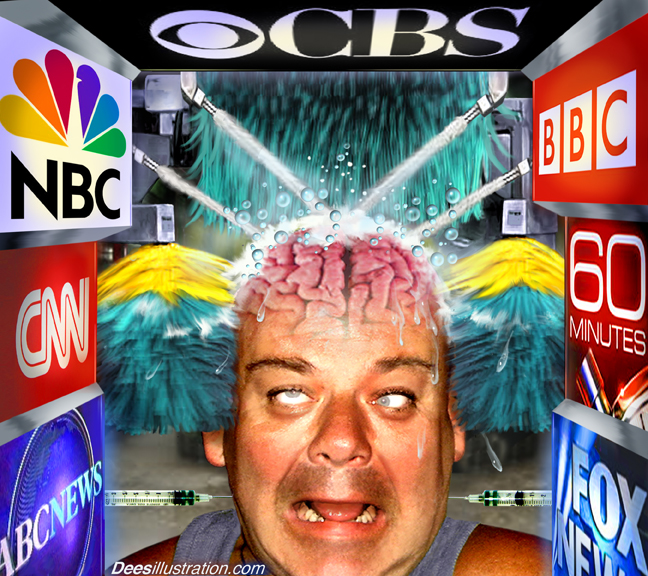
The Information in this post is going to Trigger Cognitive Biases and maybe Painful to Digest.
Nothing Is How It Looks On The Surface as the Devil Is Always in the Details.
I have heard and seen my friends and relatives respond to very important warnings with several Catch Phases that were designed by TPB to give the Programmed Masses Rationals to Ignore Warnings They should Heed. Instead of heeding the warnings the programming allows the PTB to keep them Passive while they kill them. Those Catch Phrases are as follows:
Terms in Question
Conspiracy Theory & Doom and Gloom
These Phases are thrown about by people who can’t be reached to warn of the up and coming urgent dangers because they have been Programmed to ignore everything to their own Demise. This is the saddest thing I have ever Experienced.
When We Fall for the Propaganda this is what We are AGREEING TOO & THE CONSEQUENCES.
More Quotes from Joseph Goebbels
“A lie told once remains a lie but a lie told a thousand times becomes the truth” ~ Joseph Goebbels
“Propaganda works best when those who are being manipulated
are confident they are acting on their own free will.” ~ Joseph Goebbels
“There was no point in seeking to convert the intellectuals. For intellectuals would never be converted and would anyway always yield to the stronger, and this will always be “the man in the street.” Arguments must therefore be crude, clear and forcible, and appeal to emotions and instincts, not the intellect. Truth was unimportant and entirely subordinate to tactics and psychology.” ~ Joseph Goebbels
“Think of the press as a great keyboard on which the government can play.” ~ Joseph Goebbels
“This is the secret of propaganda: Those who are to be persuaded by it should be completely immersed in the ideas of the propaganda, without ever noticing that they are being immersed in it.” ~ Joseph Goebbels
“Propaganda must facilitate the displacement of aggression by specifying the targets for hatred.” ~ Joseph Goebbels
“It would not be impossible to prove with sufficient repetition and a psychological understanding of the people concerned that a square is in fact a circle. They are mere words, and words can be molded until they clothe ideas and disguise.” ~ Joseph Goebbels
“The essence of propaganda consists in winning people over to an idea so sincerely, so vitally, that in the end they succumb to it utterly and can never escape from it.” ~ Joseph Goebbels
“We shall reach our goal, when we have the power to laugh as we destroy, as we smash, whatever was sacred to us as tradition, as education, and as human affection.” ~ Joseph Goebbels
“If you tell a lie long enough, it becomes the truth.” ~ Joseph Goebbels
“The money pigs of capitalist democracy: Money has made slaves of us. Money is the curse of mankind. It smothers the seed of everything great and good. Every penny is sticky with sweat and blood.” ~ Joseph Goebbels
“If we have power, we’ll never give it up again unless we’re carried out of our offices as corpses” ~ Joseph Goebbels
“There is no need for propaganda to be rich in intellectual content.” ~ Joseph Goebbels
“A Jew is for me an object of disgust. I feel like vomiting when I see one. Christ could not possibly have been a Jew. It is not necessary to prove that scientifically – it is a fact. I do not need to prove this with science or scholarship. It is so!” ~ Joseph Goebbels
Source: https://www.phrases.org.uk/meanings/doom-and-gloom.html
What’s the meaning of the phrase ‘Doom and gloom’?
A feeling of pessimism and despondency, often with regard to business or political prospects.
What’s the origin of the phrase ‘Doom and gloom’?
The phrase ‘doom and gloom’, which is also seen in its variant for ‘gloom and doom’, sounds as though it might be quite old – Shakespeare or the Bible perhaps? Strange to say, but it isn’t remotely old enough to be either. Shakespeare did take the word ‘gloom’ and coin the adjective ‘gloomy’, but he didn’t associate ‘doom’ with either of them. Neither of the words ‘doom’ or ‘gloom’ appear, singly, let alone together, in the King James Version of the Bible.
The phrase began to be used in US newspapers in the late 19th century – for example, this piece from the North Carloina paper The Statesville Landmark, May 1875:
“Slowly, and with a tone of doom and gloom, the ponderous clock began striking.”
The expression’s use was initially limited largely to the fields of finance and politics and wasn’t commonplace in the wider language until it was popularised via the 1947 stage show Finian’s Rainbow. Harburg and Saidy’s musical was a great popular success and was turned into a film in 1968. The character Og, a pessimistic leprechaun, repeatedly used the rhyming phrase thus:
“Doom and gloom… D-o-o-m and gl-o-o-m… I told you that gold could only bring you doom and gloom, gloom and doom.”
The phrase was began to be used by US political commentators in the 1950s, possibly due to the success of Finian’s Rainbow. By the 1970s and 80s, also possibly influenced by the success of Finian’s Rainbow, this time of the 1968 film, it was it was used in reference to pessimistic forecasts about the economy, nuclear disarmament and later the environment.
The BBC had a hand in spreading the use of the the word ‘doom’ and hence ‘doom and gloom’ in the UK. In 1970 they broadcast an influential science fiction television series called Doomwatch, which highlighted various potential doom-laden threats to civilisation. Between 1968 and 1977 (and seemingly forever since via interminable repeats) they also broadcast the popular comedy Dad’s Army, in which the lugubrious Private Frazier, played by the Scottish character actor John Laurie, would shout out “We’re doomed, I tell ye!” in virtually every episode.
Source: https://www.phrases.org.uk/meanings/doom-and-gloom.html
What’s the meaning of the phrase ‘Conspiracy Theory’?
What’s the origin of the phrase ‘Conspiracy Theory’?
Conspiracy theories have a long history, but the actual term “conspiracy theory” emerged much more recently. It was only a few decades ago that the term took on the derogatory connotations it has today, where to call someone a conspiracy theorist functions as an insult.
So it may come as no surprise that there is even a conspiracy theory about the origins of the label. This conspiracy theory claims that the CIA invented the term in 1967 to disqualify those who questioned the official version of John F Kennedy’s assassination and doubted that his killer, Lee Harvey Oswald, had acted alone.
There are even two versions of this conspiracy theory. The more extreme version claims that the CIA literally invented the term in the sense that the words “conspiracy” and “theory” had never been used before in combination. A more moderate version acknowledges that the term existed before, but claims that the CIA intentionally created its negative connotations and so turned the label into a tool of political propaganda.
The more moderate version has been particularly popular in recent years for two reasons. First, it is very easy to disprove the more extreme claim that the CIA actually invented the term. As a search on Google Books quickly reveals, the term “conspiracy theory” emerged around 1870 and began to be more frequently used during the 1950s. Even die-hard conspiracy theorists have a hard time trying to ignore this. Second, the more moderate version received a big boost in popularity a few years ago when American political scientist Lance DeHaven-Smith propagated it in a book published by a renowned university press.
Smoking gun
Although they make differing claims about the origin and development of the term, the proponents of both versions invariably point to an official CIA document called Concerning Criticism of the Warren Report as their smoking gun. It was released in 1976 after The New York Times requested it under the Freedom of Information Act.
The document expresses concern about the considerable number of people who doubted the official investigation into Kennedy’s murder, the Warren Commission, which found that Lee Harvey Oswald acted alone. It also aims to equip CIA contacts with arguments against those who challenge the findings and the official version of the event. For example, it emphasises that nobody in their right mind would have chosen someone as unstable as Oswald as a pawn in a larger plot. And it points out the logical fallacies of these alternative accounts.
One may find the CIA’s attempt to influence public opinion problematic. But there is not a single sentence in the document that indicates the CIA intended to weaponise, let alone introduce the term “conspiracy theory” to disqualify criticism. In fact, “conspiracy theory” in the singular is never used in the document. “Conspiracy theories” in the plural is only used once, matter-of-factly in the third paragraph:
Conspiracy theories have frequently thrown suspicion on our organisation, for example, by falsely alleging that Lee Harvey Oswald worked for us.
The authors of the document deploy the term in a very casual manner and obviously do not feel the need to define it. This indicates that it was not a new term but already widely used at the time to describe alternative accounts. At no time do the authors recommend using the label “conspiracy theory” to stigmatise alternative explanations of Kennedy’s assassination. This suggests that the term had not yet acquired the same level of negativity it possesses today.





0 Comments